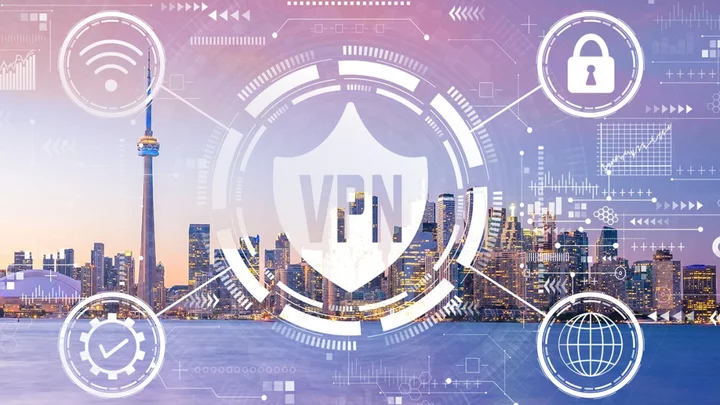For those of us who grew up just a short drive from the Ambassador Bridge to Windsor, Ontario, Canada has an outsized place in our formative years. We visited crossed the border to eat at Tim Hortons before it took over American markets. We pointed our TV antennas just so, to pick up Canadian channels. We're grateful we can now repay that nation for all it has given to us with this list of the best VPNs for Canada.
Read on for our top picks, followed by everything you need to know about choosing a VPN in Canada.
How We Picked the Best VPNs for Canada
This roundup is built with the assumption that customers are physically in Canada, so we ranked services based on their total server count within the country. With VPNs, you're more likely to get better performance if you connect to a server that's nearby, so more Canadian servers means more options for Canadians.
Keep in mind that every VPN we've tested has an extensive presence in the UK, US, and Canada, so you'll almost always find some representation. We started with our top-rated VPNs to ensure we had the best options on the list. One notable exception was exchanging Private Internet Access for HMA VPN because the latter has an impressively large worldwide server collection.
At the top of the list, we placed TunnelBear VPN, but not because of its server count. In fact, the company does not disclose the number of servers it has in any country. We gave it preference because it's a Canadian company—and an excellent service in its own right. The other services on this list operate under different legal jurisdictions, which may be an important point for some users.
How a VPN WorksCanada is an especially large country, stretching (like the US) from sea to shining sea. That can present a problem for VPN users because the farther you are from the VPN server, the more likely you are to experience internet slowdowns. At the very least, you'll probably see greatly increased latency.
More servers don't necessarily solve this problem, but more server locations might. Much of that, of course, will depend on where you are in relation to those servers. Companies with VPN servers on both the east and west coasts of Canada are more likely to provide lower latency service than companies with just one location.
At PCMag, we test VPN speeds from our offices in New York City, using only US-based VPN servers. In this location, we enjoy above-average quality of service for VPNs. That means our test results won't match those of someone in the US in a less populous region, and especially not another country—even a close neighbor like Canada.
Due to the ongoing coronavirus pandemic, all of PCMag has been working from home since mid-March, 2020. With only limited access to the PCMag Labs, we have adjusted our testing methodology. We now provide new speed test data on a rolling basis that is updated throughout the year. Our latest results are in the table below.
Do You Need a VPN in Canada?
Canada doesn't have many of the issues found in other popular VPN locales. Unlike the US, it's our understanding that Canadian ISPs cannot sell your data without express consent. Unlike China, Canada doesn't have a massive internet surveillance and censorship machine. So is a VPN of any use in Canada?
This isn't to say surveillance doesn't exist in Canada—it's a member of the Five Eyes intelligence-sharing alliance, after all. In 2017, the CBC reported that while Canadian ISPs can't sell your data, there are all sorts of ways for information to be harvested and used. That suggests VPNs may still be useful privacy tools in Canada. Furthermore, online advertisers are everywhere, and you can use a VPN to blunt their attempts at tracking your online movements as well.
How to Unblock Regional Content in Canada
We view VPNs as privacy tools, but most people probably use them to access region-locked content online. If there's a movie or show available in country X and not where you live, just tunnel into a VPN server in country X and enjoy.
In practice, it's much more complicated. Netflix, for instance, aggressively blocks VPNs, and other streaming platforms likely have a similar stance. VPNs are frequently tweaking their products to sneak by gatekeepers, in an endless streaming cat-and-mouse game. The upshot is that a VPN that works with your streaming platform of choice today may not do so tomorrow.
We periodically evaluate VPN services' ability to let us access Canadian Netflix. In our 2021 evaluation, just three services worked successfully: ExpressVPN, ProtonVPN, and Surfshark VPN.
Tips for Choosing a VPN in Canada
Before laying down your hard-earned loonies, here are two things to keep in mind when you're choosing a VPN:
First, you will always save money by opting for a longer subscription. However, we caution against this—at least initially. Instead, use a free VPN subscription or short-term subscription to test out a VPN in your home environment. That way, you can find out whether it will work with all the sites and services you need and get a feel for its performance hands-on. If you like what you see, you can always upgrade to a long-term subscription.
What Is Two-Factor Authentication?Second, while a VPN is a useful tool for improving your privacy online, it can't protect against every ill. To really anonymize your traffic, you'll need Tor, but using it will impact your internet speeds far more than a VPN. Also, advertisers and spooks have numerous tools for monitoring online activity and not all of them are stopped by VPNs.
Just because you're using a VPN doesn't mean you can slack on security in other areas either. Be sure to use a password manager to create unique and complex passwords for every site and service you use, enable multi-factor authentication wherever it's available, and install local antivirus software.
Ultimately, anyone looking for a VPN with a strong presence in Canada is lucky. After the US and UK, it's one of the most popular regions for VPN providers to focus their efforts. Canadians are also fortunate the need for a VPN is arguably less crucial than it is in many other countries, but there are still privacy gains to be had by using one. If you can't decide whether you need a VPN, our piece explaining what a VPN is, and why you need one can help you decide.
(Editors’ Note: While they may not appear in this story, IPVanish, and StrongVPN are owned by Ziff Davis, PCMag's parent company.)









